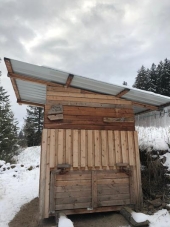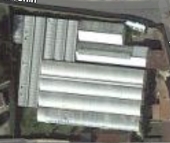Oh wow! Love these questions and ideas. Thank you all so much! I know this discussion is going to help clarify this project even more!
I'm hoping that by answering some of your questions, you can offer more specific advice, raise new concerns, or otherwise point me in the right direction.
 Several of you mentioned the financial aspect.
Several of you mentioned the financial aspect. The short story is that currently I really don't know if/how this can work financially. I will certainly develop this further to have a more firm plan, but here are a few details:
- We don't yet know how much he wants to sell the land or business for. I know the owner a little bit, and he's a fairly reasonable guy. He's fairly honest about what's working and not working. He took me on a tour of the heating system in the greenhouses recently and shared the elements that are broken and why he doesn't run the system. I also know that sometimes he hides details in plain site (long story), so I will have to be very careful and ask a lot of questions to learn more about the quality of the business he has built. I also know he has tried to find buyers already and he doesn't have anyone. He tried to sell the land to the town, and to other various investors and nobody wants it. He feels down to the wire because he wants to retire in 4 years and he doesn't have a plan yet.
- And I have not yet seen his books to judge whether he is making a living or not. Great suggestion to ask to see that information. Based on everything I've learned about him and his business over the past 18 months, I think that he is more than making ends meet - for France(!) - but that he's not bringing in a very high income by any stretch of the imagination.
- There are some special grants available for various economic development projects in the area, up to 20% of the purchase price if I'm not mistaken. It's specific to this region because of some government activity going on here.
- As a cooperative, with the special public sector sticker/certification, I think we might be eligible for additional grants and special loans.
- There may also be special funds for agricultural activities that we might be able to tap into.
- Also as a cooperative, there would be other people investing with us, so the risk would be distributed.
As mentioned, that also means that the profits would be distributed, and that's totally ok with me. In fact, that's what I would prefer, because I truly believe this is the business model that will keep small/locally owned companies and small towns alive. (I love this quote: "As member-owned, member-run and member-serving businesses, cooperatives empower people to collectively realise their economic aspirations, while strengthening their social and human capital and developing their communities." from the International Cooperative Alliance.
https://ica.coop/en/cooperatives/facts-and-figures)
Thom Bri, you asked some excellent questions. I'm grateful for your thoughts and feedback! Thank you! Here are my answers to your questions:
Is there a market for the things I want to produce?
- I would reverse this: I'm willing to do the market research needed to find out what the gaps are in the market and fill those. I think I have the network necessary to talk to the right people to figure this out. To start with, I'm friends with the owner of the local organic store, but I'd also need to talk to the owners of local restaurants who I don't yet know.
Can I sell to more distant markets if local markets are insufficient?
- This seems doable, but would require excellent networking and sales operations. Good to keep in mind.
Do I have business experience?
- Yes and no. My background is quite varied. I was the financial manager of a nonprofit with a $2 million housing renovation budget, and a $600k operations budget. I fixed our accounting system and cleaned up our reporting to drop our external audits down from 4 weeks to 4 days. I'm good at admin efficiency and creating systems that improve everyone's experience. I have experience as a communications manager for an international nonprofit, and have a strong sense of marketing and communications. Currently, I run a small solopreneur business doing communications training for climate advocates. Fortunately my father, grandfather and mother all run their own businesses, so I have their guidance to help as well.
Anne Miller, you asked about whether having a market garden appeals to me. Yes! That's certainly a strong possible future use of this land/ these greenhouses. Thank you for reminding me that selling to restaurants is an option. It hadn't occurred to me.
John F. Dean, you shared such great ideas. Thank you! I hadn't thought about the benefits of specializing (your examples of tomatoes, bourbon, salad or herbs were helpful). That's a great suggestion, and of course I'd have to do adequate market research to know which products would fill a market gap.
Permaculture question: is year-round tomatoes ok in the permaculture space? I know that the temps get down to freezing here, so I think we'd need to heat the greenhouses to have year round tomatoes. Unless we heat them with manure/compost, I wouldn't want to go down that path for environmental reasons. (see my last comment/question below)
You also asked a really great question about location. We are 90-minutes to 2 hours away from Troyes, Dijon, Nancy and Reims, 3 of which have well over 100,000 in population. Are those distances too far? Or would that be a suitable distance? What distance would be considered 'too far'?
Hans Muster, I had vaguely thought of having chickens, but wasn't sure how to incorporate this. Your idea of stacking functions is awesome. I am definitely open to exploring this more. Thank you for sharing this idea!
Nancy Reading, thank you so much for your encouragement, ideas and solid advice! I won't comment on every detail, because you shared so many great tips, several hidden in questions that I don't have the answers to. You asked a few questions that I wanted to briefly respond to:
- The land has a well on it, from an underground spring. I don't know if he uses that water, or if he uses the town water supply. I don't know if he collects rain water for his plants, but I love the idea!
- Love the rocket-mass idea for catering events and possibly for heating a part of the greenhouse. I am interested in that, but also have some hesitations about heating greenhouses for environmental reasons. (see below)
So, I have a
burning question about heated greenhouses in the context of permaculture. In French environmentally-friendly circles, people are quite opposed to heated greenhouses. And the French law only allows organic-labeled food to be in heated greenhouses from 21 December to 30 April every year. What is the permaculture philosophy on heating greenhouses?
Thank you all so much for your thoughts and suggestions! I'm incredibly grateful to each of you!











